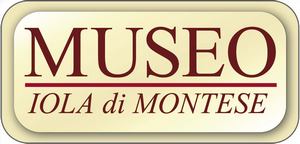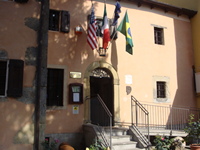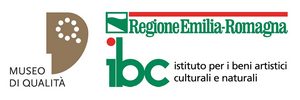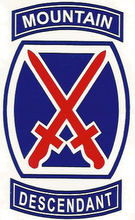Museal system

The MUSEAL SYSTEM of Iola Montese was founded in 2011 and consists of a series of collections, of approximately 4,000 objects, which are exhibited over 16 rooms with a total area of about 600 sqm. Additionally, there are itineraries through the battlefields where Allied and German soldiers fought during the months between late 1944 and early 1945 on the last line of defence of the Green Line better know as the Gothic Line.
The museum, recognized MUSEUM OF QUALITY by the Institute of Artistic Heritage Cultural and Natural Heritage of the Emilia Romagna Region, overlooking the square of the village, which is located about 920 meters above sea level, beside to the church built in 1630's. The hospitality is guaranteed by large parking area and nearby restaurants, one of which is reached by a short walk.
 The collections MEMOIRS OF ITALY are dedicated, since its establishment in 2003, to the World War II period and consist of five rooms devoted to the armies that fought in the areas adjacent the hill town of Iola between last months of 1944 until the end of war in Italy: Wehrmacht Heer, 232nd Infantry Division and the 114th Jager - U.S. 10th Mountain Division - BEF, Brasilian Expeditionary Force and the Royal Italian Army.
The collections MEMOIRS OF ITALY are dedicated, since its establishment in 2003, to the World War II period and consist of five rooms devoted to the armies that fought in the areas adjacent the hill town of Iola between last months of 1944 until the end of war in Italy: Wehrmacht Heer, 232nd Infantry Division and the 114th Jager - U.S. 10th Mountain Division - BEF, Brasilian Expeditionary Force and the Royal Italian Army.
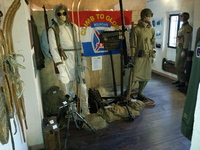 All items, collected by typology, represent what was available to soldiers on the front line. On display there are uniforms, decorations, badges, weapons, everyday objects, medical first aid and various type of clothing and accessories. The collections, which highlight the technical features and quality of the equipment available until the first line of battle, aim to understand the logistic organization behind the fighters on the various battlefields in accordance with the axiom that wars are won by the army with the men more motivated and the better logistics organization. The museum was officially recognized by the 10th Mountain Division Descendants who organizes, every three years, the return on the battlefields of the Tuscan-Emilian Apennine. The next tour is scheduled on June and will be an important event by resorting the 70th anniversary of the 5th Army battle that, in this area, led the breakthrough of the German defenses by 10th Mountain Division soldiers. The Brazilians soldiers, after the conquest of Monte Castello and Montese, replaced the Americans in the backline. In the rooms devoted to the history of our country there are also books, report cards and school objects of the prewar period.
All items, collected by typology, represent what was available to soldiers on the front line. On display there are uniforms, decorations, badges, weapons, everyday objects, medical first aid and various type of clothing and accessories. The collections, which highlight the technical features and quality of the equipment available until the first line of battle, aim to understand the logistic organization behind the fighters on the various battlefields in accordance with the axiom that wars are won by the army with the men more motivated and the better logistics organization. The museum was officially recognized by the 10th Mountain Division Descendants who organizes, every three years, the return on the battlefields of the Tuscan-Emilian Apennine. The next tour is scheduled on June and will be an important event by resorting the 70th anniversary of the 5th Army battle that, in this area, led the breakthrough of the German defenses by 10th Mountain Division soldiers. The Brazilians soldiers, after the conquest of Monte Castello and Montese, replaced the Americans in the backline. In the rooms devoted to the history of our country there are also books, report cards and school objects of the prewar period.
